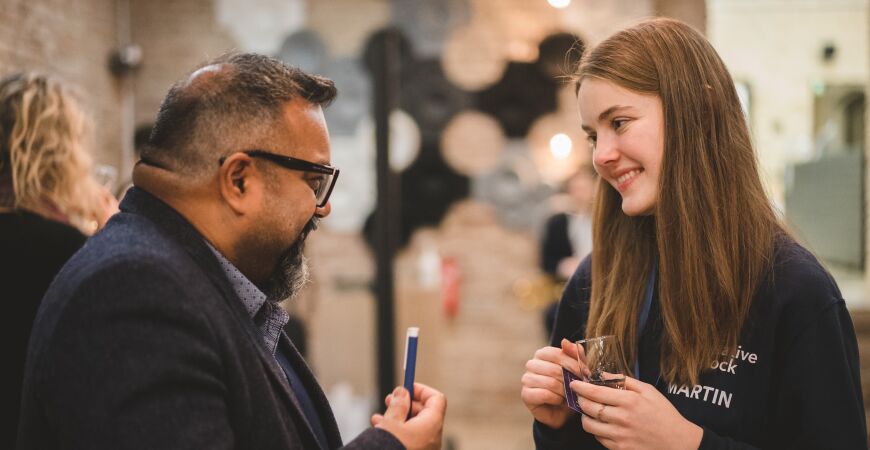

Thu 10 / 02 / 22
What is intersectionality? And why is it important for your business?
In the latest update from Brighton's Equality and Inclusion Partnership, Ellie Thompson from Diversity and Ability shares what intersectionality is, and why it's important for every business.
By Ellie Thompson of
As Brighton Chamber’s representatives in Brighton and Hove’s Equality and Inclusion Partnership (EQuIP), Diversity and Ability (D&A) ensure the interests and concerns of Brighton’s business sector are counted in decisions made about the future of our city. The most recent quarterly EQuIP meeting was held on Tuesday 1 February, giving the partnership an opportunity to discuss important steps to making our city inclusive and diverse.
Although at face value, our discussions centred on specific issues, such as creating an accessible city strategy and reviewing progress towards Brighton becoming an anti-racist city, intersectionality was at the heart of all strategies. But what does intersectionality really mean? Why is it becoming so central to discussions at the moment? And why is it relevant for your business?
What is intersectionality?
The term ‘intersectionality’ was coined over 30 years ago by US lawyer and civil rights activist Kimberlé Crenshaw to highlight the fact that the experiences we have as humans can’t be separated into individual identities. Different aspects of our identity - for example, our disability, gender, race and culture - intersect. And, in a society that’s primarily designed to include only one type of person, the rest of us are presented with barriers that intersect based on our identities and create a marginalising environment for us.
For example, at D&A we always celebrate the fact that we’re a social enterprise led by and for disabled people. But we’re not just disabled people, and often we experience other aspects of marginalisation too. We also experience disabling barriers linked to our LGBTQ+ identity, our gender, our experience of care and so much more.
Why is it important to talk about intersectionality in the workplace?
“If we don’t have an intersectional approach, we don’t have a relevant one,” says Atif Choudhury, CEO of D&A. Often conversations about diversity and inclusion for businesses focus on one particular identity. Your business may have a disability working group, an anti-racism agenda, or a strategy around particular awareness days and months like Pride Month or Black History Month. But we can’t create a business that’s inclusive if we focus on one identity at a time, because that’s not how we experience the world.
By taking an intersectional approach to inclusion, you create the space to see people as individuals and hear them when they tell you what particular barriers they face, and what can be done to break those barriers down.
And when you get this right, you’ll see holistic results across all aspects of your organisation. In D&A’s last update from EQuIP, we highlighted how inclusion really benefits your business, improving everything from external reputation to new business development. What’s more, the benefits to your employees can’t be underestimated. Creating a workplace culture where employees feel safe to bring themselves to work means creating an environment where their mental health will be more safeguarded, they’ll work in the way that’s best for them, and feel truly invested in the work of your business.
How can you put this into practice?
Centre lived experience
Often diversity and inclusion conversations and practices are focused on legal rights and responsibilities. But there is an alternative approach: recognising the strength and value of equitable participation. Acknowledge which voices have been historically excluded or ignored, not just at a societal level but within your business or team. And take steps to build a culture that welcomes and celebrates diversity, rather than reacts and adjusts to it.
Engage with your own inclusion strategy
If you’re a business leader, make sure you haven’t delegated your diversity and inclusion work to a specific person or department, or even to a specific strategy. You’ll only be able to foster a culture that’s inclusive to all if you’re actively involved in that process, so lead by example and be an active part of your business’s inclusion work.
Be an active participant in wider inclusion work
There is so much we can do as individuals and organisations to build towards intersectional inclusion. But there are also so many barriers that are reinforced and strengthened by wider society.
We can make real change by taking or making opportunities to participate in larger-scale inclusion strategies. And EQuIP gives us the chance to do so within our city. D&A are a part of EQuIP because we want to ensure the goals, concerns and needs of Brighton’s businesses are represented. The more we hear from you, the better and stronger that role will become.
So get in touch with us before the next meeting on Wednesday 27 April - just email emma.turner@diversityandability.com and let us know how we can best represent you.
If you want to contribute to the Chamber blog, contact us on hannah@brightonchamber.co.uk



